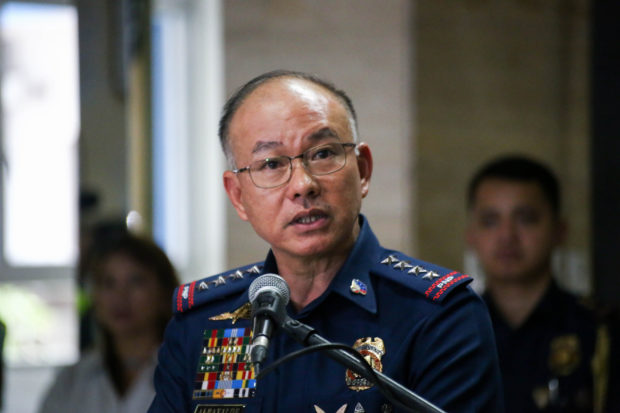
PNP Chief Oscar Albayalde during a press briefing at NHQ, Camp Crame, Quezon City. INQUIRER PHOTO/ JAM STA ROSA
MANILA, Philippines — The Philippine National Police (PNP) and the Armed Forces of the Philippines (AFP) have officially signed the document recommending the extension of martial law in Mindanao for another year.
PNP Chief Director General Oscar Albayalde revealed this in an interview with CNN Philippines on Wednesday.
“We have just signed a document together with the outgoing AFP Chief of Staff recommending the extension of martial law in Mindanao for another year,” he said, referring to AFP Chief General Carlito Galvez Jr., who will reach the mandatory retirement age of 56 on December 12.
Albayalde told INQUIRER.net in a text message that the document was signed on Tuesday.
Both the AFP and the PNP earlier said they will recommend the third extension of martial law in Mindanao.
President Rodrigo Duterte has been waiting for the recommendation of the PNP and the AFP before asking the Congress for another extension of the martial law in the region.
Lesser crimes
Albayalde said martial law has also made a “drastic improvement” in terms of the crime situation in Mindanao.
“Because of the martial law, we have [observed] a drastic improvement in terms of the situation of Mindanao, where the crime volume dropped by 28,853 or 32.8 percent,” he said.
“In particular, we have recorded a drop of 44.2 percent on index crimes. That includes murder, physical injuries, homicide cases,” he added.
He also said that less than 10,000 loose firearms have been also recovered by government troops since martial law was implemented.
“These are all the good effects of martial law in Mindanao,” he said.
Albayalde also brushed off doubts that the increased deployment of the police and the military could scare away tourists from going to Mindanao.
He said the tourism rate in the region might have even increased, since tourists would feel secure with troops deployed in different areas.
Asked if reducing criminality in the region is originally the job of the police even without martial law, Albayalde said: “But you know when you say martial law, we have more forces there. Remember the forces of the AFP are concentrated now on Mindanao and also the offensives are so massive.”
“One more thing is the control of politicians over the police, medyo nawala iyon (it somehow diminished), the control and supervision of the local chief executives to their local police,” he added.
No case of rights violations
“We haven’t heard a single case of human rights violation in Mindanao since the implementation of martial law,” Albayalde further said, assuring that the PNP will report to the media if there were any incidents of human rights abuse.
He also claimed that allegations on human rights violations by the police and the military against locals have no proper grounds.
“But no case was ever filed. These are all allegations and they are not even substantiated,” he said.
Meanwhile, Albayalde doubts that a nationwide martial law will be declared, saying that the President has “over and over again” said he will not extend it over the whole country.
He also said that the declaration of Memorandum Order No. 32 ordering the deployment of additional government forces in Samar, Negros Oriental, Negros Occidental, and the Bicol Region is different than the martial law in Mindanao since there are only certain provinces in these areas that are critical.
READ: Duterte’s Memo No. 32 not a prelude to nationwide martial law — PNP chief
Albayalde was then asked about the Article VII, Section 18 of the 1987 Constitution, which says the President as Commander in Chief can place the country or any part of it under martial law or suspend the privilege of the writ of habeas corpus “in case of invasion or rebellion, when the public safety requires it.”
“Marawi is a very good example already. Ano pa ang hinahanap natin (What else are we looking for)? The Marawi incident, isn’t that rebellion?” he said, referring to the brutal attack of ISIS-inspired Maute Group in Marawi City which displaced over 200,000 residents in 2017.
Albayalde explained that armed groups also go around the whole Mindanao, including places in Zamboanga City and Basilan. “There are cases of kidnapping also,” he said.
In May 2017, Duterte declared martial law in Mindanao after the ISIS-inspired Maute Group attacked Marawi City.
Under the 1987 Constitution, martial law can only be imposed for a maximum of 60 days. But before it expired in July last year, Duterte asked Congress for its extension until December 2017.
Duterte again requested that martial law in the region be extended for a year, or up to December 31, 2018, citing continuous insurgency of the New People’s Army in the region. /je